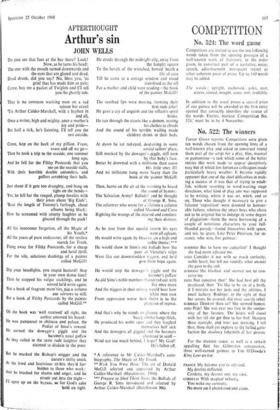Arthur's sin
AFTERTHOUGHT JOHN WELLS
Do you see that face at the bar there? Look! Now, as he turns his head: The one with the mouth turned downwards and the eyes that are glazed and dead. Dead drunk, did you say? No, bless you, 'tis grief that has made him so pale; Come, buy me a packet of Twiglets and I'll tell you the ghastly tale.
That is no common working man on a sad saloon bar crawl 'Tis Arthur Calder-Marshall, with a hyphen in and all, Once a writer, high and mighty, once a mother's joy and pride— But half a tick, he's listening. I'll tell you the rest outside.
Come, hop on the back of my pillion. Vrum, vrwn and off we go— Then he took a trip to the seaside, one summer long ago, And he fell for the Filthy Postcards that you see on the seaside stalls, With their horrible double ontonders, and golfers scrubbing their balls.
Just shout if it gets too draughty, and hang on tight on the bends— Yes, he fell for the rouged, plump lovelies with their jokes about 'Big Ends': 'Bout the length of Tommy's furlough, about albums being black : How he screamed with smutty laughter as he gloated through the pack!
All his innocence forgotten, all the Magic of his Youth,* All the years of pure endeavour, all the restless search for Truth, Flung away for Filthy Postcards, for a cheap and lurid thrill, For the vile, salacious daubings of a painter called McGill!
Dip your headlights, you stupid bastard! Stay in your own damn lanel Then he stopped his vulgar cacklings, and he vowed he'd write again. Not a book of fragrant mem'ries,,not.a volume our sorrows to still, But a book of Filthy Postcards by the painter called McGill.**
Oh the book was 'well received' all right, the author amassed his hoard: He was pampered in chfiteau and palace, the Pedlar of Smut's reward. He earned the dowager's giggle and the baronet's nasal guffaw As they rolled in the same rude laughter they claimed to disdain in the poor.
But be marked the Bishop's snigger and the curate's shifty smirk At the lewd and lascivious tit-bits they'd for- bidden to those who work : And be blushed for shame and anger, and he strode out into the night— I'll open up on the bypass, so for God's sake hold on tight. He strode through the midnight city, away from the lamplit square To the hovels of the wretched, bowed 'neath a life of care Till he came to a cottage window and stood transfixed at the sill For a mother and child were reading—the book of the painter McGill!
The rosebud lips were moving, forming their first rude joke! He gave a cry of anguish and the villain's spirit broke. He ran through the streets like a demon, tearing his clothes to shreds And the sound of his terrible wailing made children shrink in their beds.
At dawn he sat red-eyed, despairing in some sordid sailors' place, Still mocked by the dowager's giggle, still torn by that baby's face. Better be drowned with a millstone than cause His little ones ill! And no millstone hung more heavy than the book of the painter McGill.
Then, borne on the air of the morning he heard the sound of hymns: The Salvation Army! Ballads! and he thought of George R. Sims. The reformer who wrote for a lifetime a column called Mustard and Cress Righting the wrongs of the injured and comfort- ing their distress.
As he rose from that squalid tavern his eyes were all agleam, He would write again, by Heaven, on a high and noble theme :*** He would show in Sims's old ballads how the poor of Victoria's reign Were like our down-trodden niggers, and he'd give them hope again.
He would stop the dowager's giggle and the baronet's guffaw As old Sims's noble numbers thundered out with fire once more And the niggers in their misery would hear how white men rose From oppression worse than theirs is to the plateaux of repose.
And that's why he stands so gloomy where the 'baccy smoke hangs thick, He produced his noble opus and they laughed themselves half sick And the dowagers all giggled and the baronets clustered to scoff— Wind not too much behind, I hope? My God! He's fallen off.
* A reference to Mr Calder-Marshall's auto- biography, The Magic of My Youth.
** Wish You Were Here: The art of Donald McGill selected and appraised by Arthur Calder-Marshall (Hutchinson, 1966).
*** Prepare to Shed Them Now: the Ballads of George R. Sims introduced and selected by Arthur Calder-Marshall (Hutchinson 30s).














































 Previous page
Previous page